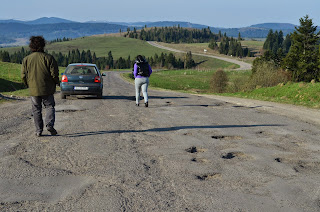"Ukraine as a holiday destination? You're mad." We heard that quite often and we got used to it. Beside curiosity we had an additional reason to go there: my great grandfather's brother is buried there. He joined the Austro-Hungarian army in 1914, was taken to Galicia to fight against Russia, survived a few battles fought around the town of Stryj, and died in August 1916 in the so-called Brusilov offensive. He was shot in the abdomen, died on the same day, at the age of 21, and was buried in Stryj. We still have the letter announcing his death. As traveling individually was not allowed in the Soviet times, his brother (my great grandpa) and sister could never visit his grave. Before passing away, the old lady gave my mother the few things of his late brother which she got back from the battlefield, and said: if anyone ever has the chance, please visit his grave.

So we packed our things and, after spending a night at a friend's house in Máramarossziget/Sighet, we crossed the border on foot and arrived to Solotvino/Aknaszlatina, a small town inhabited by Romanians, Hungarians and Ukrainians. Communication was not such a problem here, after all. We just had to find the person who spoke one of the languages we knew. Our train to Lviv / Lemberg was leaving around 6 p.m., so we had plenty of time to walk around. We went to the market and had shashlik and beer for lunch.
In the back streets people were chopping wood for winter.
Ukraine inherited its trains from the Soviet time. The rail is wider and traincars are much larger.
Ukraine has 4 timezones and trains run according to Kiev time. BUT: in Solotvino they use the Central European one, which is one hour behind the Romanian one, which is 3 hours behind the Moscow timezone used in the eastern part of Ukraine... You got it, right? We asked 4 or 5 different people to make sure that we won't miss the train and to know the exact time. We tried to purchase places in a sleeping car but we only managed to get the so-called "platskartny" seats, in an open carriage. The cost was less than 2 euro/person for a 400 km ride but... The train car is open, everyone can see, hear, touch and smell everyone.
Every traincar is accompanied by a provodnik, a carriage attendant who gives people blankets, hot water for tea and keeps order. As his salary is quite poor, he also sells beer and vodka to the passengers. There is only one train going to Lviv each day, so a car transporting prisoners was attached to the end of the train too.
It was an extremely social journey. We were the only foreigners on the train, we quickly became friends with a young local Hungarian man who translated for us. In just half an hour I was already chatting with Vladimir, a trauma doctor from Hust who was travelling to visit his son and grandchildren. Vladimir is in a good relationship with a few hospitals from Germany and takes medicines and other medical equipment to the warzone in Eastern Ukraine. Meanwhile my husband was talking to a Ukrainian family who wanted to share their dinner with us.

The man was preparing to leave for Russia to work. "But Ukraine is at war with Russia", I said. "I don't care. I can make money there, and that's all that matters. War is the business of politicians", he replied. After saying good bye to Vladimir and finishing a bottle of vodka and several beers with our neighbours, we prepared to get some sleep. A Russian lady from Sambir was napping on the opposite bed, my husband and son were sleeping on the upper ones. In a few hours nearly everyone was asleep, some were snoring, others were quietly scrolling their ipads or phones. I spoke a few words with the Russian lady and I was glad to find out that I could at least understand what she was saying.
We were awaken by two old men and a drowsy boy sitting on the bed where the Russian lady used to sleep, and talking quite loudly. In an hour we arrived to Lviv / Lemberg, the largest city in Western Ukraine, the former capital of the Kingdom of Ruthenia, incorporated later into the Kingdom of Poland and then, the Austro-Hungarian Monarchy. The 400 km journey lasted precisely 12 hours.































































